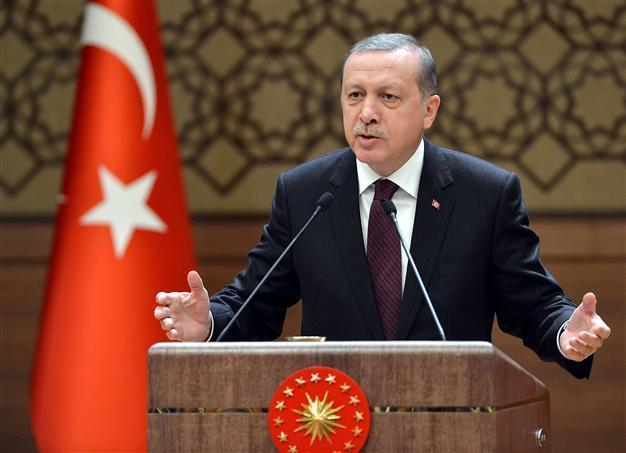Turkish President Erdoğan says UK is semi-presidency dominated by Queen
ANKARA

AA Photo
Refusing to remain silent on insisting on the need to scrap Turkey’s parliamentary system, Turkish President Recep Tayyip Erdoğan has given clues to his favorite semi-presidency model.
Erdoğan also called on citizens to vote in favor of “a new constitution” in upcoming parliamentary elections.
“In my opinion, Britain is a semi-presidency. The predominant constituent is the queen,” Erdoğan said late Jan. 29, in a bid to justify his aspirations for a systemic change in Turkey, suggesting that the United Kingdom was run as a semi-presidential system in which the will of the queen is dominant.
His comments on the largely ceremonial monarchical system in the U.K. and its hereditary monarch, Queen Elizabeth II, came after he was reminded of opposition criticism that he actually wants to be a “sultan” through the presidential system.
“Look, is there a ‘padishah system’ in America at the moment? When it is America, it is not a padishah system; when it is Brazil, it is not a padishah system; when it is South Korea, it is not a padishah system, when it is Mexico, it is not a padishah system. I mean, why is it only a padishah system when an idea like this is floated in Turkey?” Erdoğan said during a live interview on public broadcaster TRT Haber.
“For example, the prime minister takes charge, let’s say, as the first vice president, but not as the prime minister,” he said, while also elaborating on what he has in mind as a prospective presidential system.
The day after delivering the comments, Erdoğan urged people to prioritize the drafting of a new constitution by the next government when they vote in parliamentary elections in June.
“We are working with love for our nation,” Erdoğan said Jan. 30 in the Central Anatolian province of Kırşehir where he addressed people on the occasion of a collective opening ceremony for various facilities.
“This year is an important year. There is an election on June 7,” Erdoğan said as he underlined that the election was particularly important for fulfilling the goals set for 2023, the centennial anniversary of the foundation of the Republic of Turkey.
“There is one thing which has been left half-finished, that we haven’t been able to achieve: a new constitution,” he said, referring to the fact that a parliamentary panel tasked with drafting the country’s first civilian constitution was officially dissolved in late 2013 after nearly two years of futile work.
“You should fairly manifest your will for the ‘New Turkey and the new constitution.’ I believe that just like how a strong will emerged in the presidential election [in August 2014], the required stance will be displayed on June 7 too. You will manifest the power which will found the new constitution and you will lay the foundation for the New Turkey,” he said.
Accused by critics of suppressing checks to his power in the judiciary and media, Erdoğan said this week that the question of constitutional change to cement the presidency should be a central issue in polls to be held by early June.
“The biggest advantage ... would be in abolishing policy-making through multiple channels,” he said, denouncing the “cacophony” that he said slowed down decision-making at the moment.
The president’s opponents say power has become too centralized in Turkey and the atmosphere poisoned by accusations of graft and purges against perceived enemies in the police and the judiciary.
This week, a senior Justice and Development Party (AKP) executive said a new constitution and the adoption of a presidential system are the two major goals of the ruling party in its pre-election campaign, while also arguing that France’s semi-presidential system was the most appropriate for Turkey.
“In my opinion, a semi-presidential system is the most convenient one for Turkey. In the elections, people vote for those who they want to see as its rulers. That is, they don’t reward political parties they want to punish at polls as coalition partners,” said Mustafa Şentop, the deputy leader of AKP responsible for the election as well as the presidential system. Şentop is a constitutional law professor and is known as the architect of the AKP’s works on presidential system.
On the same day when Şentop’s remarks were delivered, some newspapers reported on Jan. 29 the presidential system would be the top highlight of the AKP’s election declaration.
On the same day, however, AKP Deputy Chair Beşir Atalay refuted the reports, saying the study on election declaration was not yet finalized.
